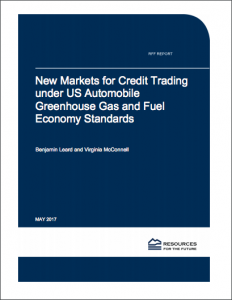Full Title: New Markets for Credit Trading under US Automobile Greenhouse Gas and Fuel Economy Standards
Author(s): Benjamin Leard and Virginia McConnell
Publisher(s): Resources for the Future
Publication Date: May 1, 2017
Full Text: Download Resource
Description (excerpt):
Recent changes to the US Corporate Average Fuel Economy (CAFE) regulations that allow for credit banking and trading have created new opportunities for lowering the cost of meeting strict new standards. For the first time, automakers will be able to trade credits between their own car and truck fleets and across manufacturers, and they will be able to bank credits over longer time periods. The potential to lower the costs of the regulations could be large if well-functioning credit markets develop. A recent development is that new regulations starting in 2012 for greenhouse gas (GHG) emissions overlap with the CAFE standards, creating two separate regulations and two separate credit markets, one for fuel economy (regulated by the National Highway Traffic Safety Administration) and one for greenhouse gases (regulated by the Environmental Protection Agency). We find that although the two regulations are supposed to be harmonized, there are some important differences in how credits are defined and how they can be traded, creating added costs for manufacturers. We review evidence on how well the credit markets are working, including the extent of credit banking and the number and price of trades. We then assess the potential for the following to interfere with well-functioning markets: overlapping regulations, reductions that are not additional, thin markets, and use of monopoly power. We find that some features of robust trading are missing and discuss some possible ways to improve efficiency in these markets.
